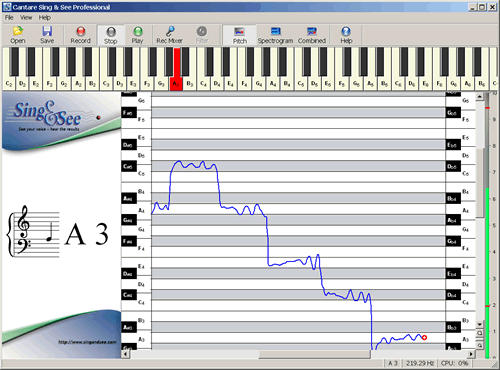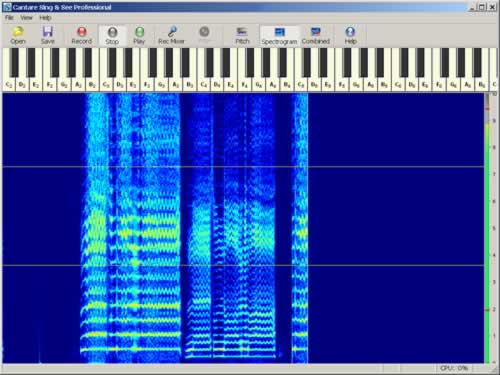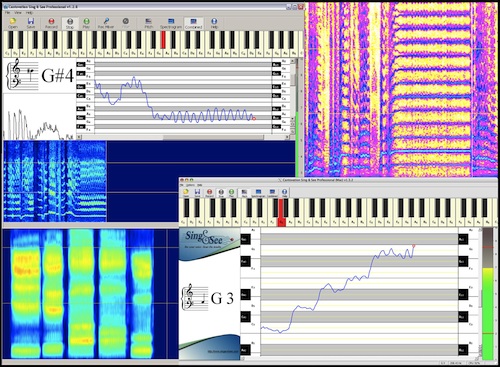SING&SEE - Visual Feedback for vocal training
SING&SEE is software that analyses the voice - while you are singing - and displays information about your singing on the screen. The first critical aspect of singing is pitch, and the pitch display screen presents the pitch of the voice in a clear and musically relevant format. Of course, singing is nothing without resonance (timbre, color, ring, or any number of other descriptors for the "quality" of the voice tone) and this reveals itself in the spectrogram.
Pitch Display Screen

In the pitch view, the exact pitch of your voice is shown while you sing. You can see what note you are singing on the piano keyboard and stave - this can help in learning to identify the sound of your voice with specific notes. You also see a line that mirrors how your pitch moves with time as you sing a single note or a range of notes. The continuous line allows you to see visually the control of pitch, and even details such as vibrato and how easily you move from one pitch to another.
The pitch tracing shows you how accurately you achieve each pitch, how smooth the onset to the note is, and also how the vibrato in your voice appears.
Spectrogram Display Screen

The spectrogram shows you the timbre of your voice - the visual display representats the harmonic structures in the voice and how it changes while you're singing. This display provides a visually rich picture of the voice's character over time, including vowel shapes, singer’s formant, twang, breathiness, voice onset, vibrato, and pitch variation.
In singing, the spectrogram shows how the pattern of harmonics change as you sing different vowels or otherwise change the timbre of your voice. It also shows how "bright" your voice is (the so-called "singer's formant" or "ring") - this comes up as a band of bright color in the middle part of the display (between the two horizontal lines).
The spectrogram shows the pattern of harmonics in your voice. Time proceeds horizontally, and higher harmonics are represented higher on the vertical axis. The brightness of the color indicates the strength of the harmonic at that point in time and frequency. The two horizontal lines show 2kHz and 4kHz - below 2kHz the patterns are generally dependent on what vowel you're singing; while between 2 and 4kHz is the region of "singer's formant" (sometimes called "twang").
"I don’t see why every singer doesn’t use this tool. As a singer, you hear (or should hear) the music and pitches in your head as you vocalize a song. And this comes from remembering the music and the pitches. If you’re singing off pitch, you’re remembering, for recall, off pitch notes. I think any singer who is serious about their craft should definitely use this tool as part of their daily exercises to improve their pitch accuracy, and to help them better distinguish, pitch wise, between a sharp, flat and natural note."
Stephanie, NJ
Features
Find out more about the features of the SING&SEE software.
Software Products
We have developed several versions of SING&SEE for different needs, whether you're a beginner, professional singer, or teacher.
SING&SEE Research
SING&SEE was developed based on our research into the use of visual feedback in singing teaching at the University of Sydney.
Get SING&SEE now
Join the thousands of people around the world who are using SING&SEE to enhance their singing training! Click here to purchase a copy of the software for your Mac or PC.


